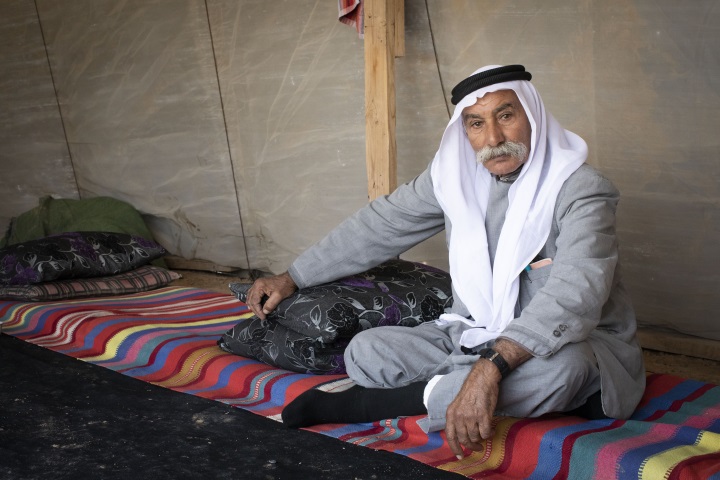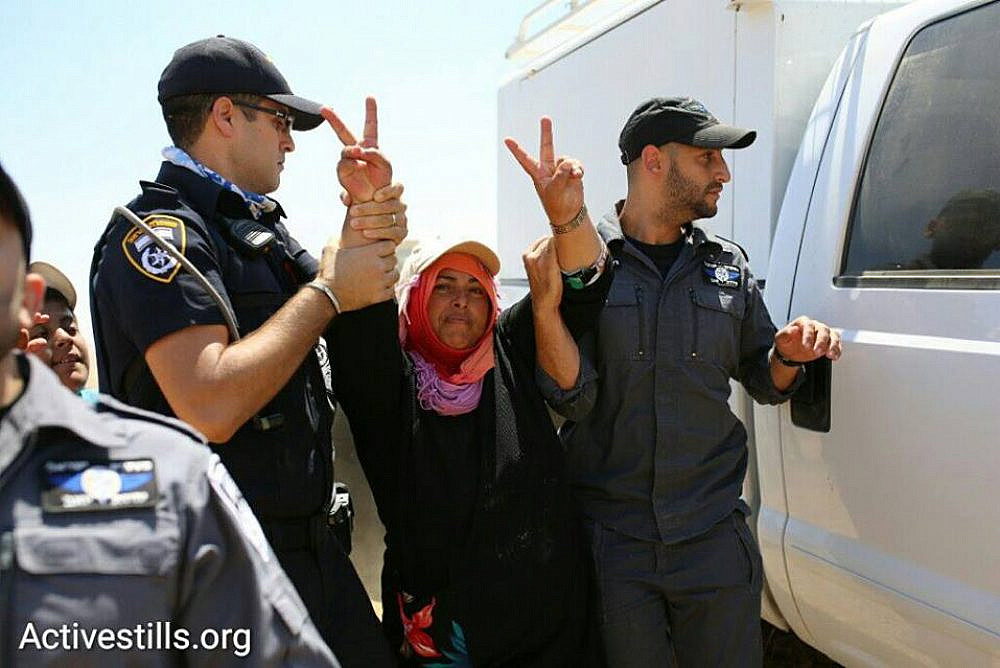Israeli forces raided the unrecognized Bedouin village of Al-Araqib and arrested its leader, Sheikh Sayyah Abu Mdeghem, as part of a growing campaign to try and force the residents off their land.
Abu Mdeghem was released after a few hours, but he and other residents say that Israel has stepped up its activities against Al-Araqib — a tiny hamlet in the Naqab/Negev Desert that has been demolished 173 times since 2010 — in recent months. They cite more frequent demolitions, raids, arrests, and interrogations, as well as confiscation of equipment.
In response, village residents and activists have launched a crowdfunding campaign that they hope will cover legal costs incurred by Al-Araqib residents who are fighting to have their claims to the land recognized in court. That process alone is likely to cost the community around NIS 400,000.
“They’re trying to drive Al-Araqib’s residents into despair and they’re not succeeding,” said Abu Mdeghem’s son, Aziz. “But they’re adding more and more pressure.” Aziz, who was attending a weekly protest against the demolitions of the village, added that the state upped its oppression around the time that his father was released from a 10-month prison sentence late last year, after Israeli authorities .
Abu Mdeghem was charged at the time with “unlawfully entering and trespassing on public land,” simply for insisting on remaining in his home. “They wanted to shut down our celebration over my dad’s release,” Aziz continues. “They began harassing us daily with demolitions and arrests.” Aziz himself has been arrested four times since last summer. His father has been arrested five times, and a woman living in the village has been detained twice.
Over the past decade, the village has become a symbol of Palestinian sumud (steadfastness) and resistance to efforts to expel the Bedouin from their land. After every demolition, the residents rebuild their tents and shacks, which the state views as a fresh offense. Al-Araqib is one of the 37 unrecognized Bedouin villages in the Naqab. The villages are neither connected to utilities such as water and electricity, nor do they receive municipal services, and do not have access to a local school or medical clinic.

According to the Negev Coexistence Forum, Al-Araqib’s residents have been tangled up in legal proceedings regarding ownership of their land for the past 12 years, and have been hit with NIS 1.6 million in fines along the way. They have faced hundreds of arrests over the past decade and thousands of their trees have been uprooted. The village’s land was expropriated under a 1953 law that allowed the state to easily take land for purposes of “development, settlement, and security.” However, Israeli authorities have yet to use the land for any purpose.
In the 1970s, Israel allowed Bedouins to file land ownership claims. At least on paper, it offered them a fair process for adjudicating such claims. In the early 2000s, however, the state froze that process and began filing counter claims on plots of land claimed by Bedouin citizens of Israel, seeking to register the plots as state land. That’s precisely what happened when Al-Araqib filed an ownership claim.
The state has a 100 percent success rate in all of the counter-claims it has filed.
In additional to the ongoing court cases vis-a-vis land ownership, there are also criminal proceedings underway against Abu Mdeghem and other residents. An Israeli court recently ruled that the villagers had to pay a NIS 360,000 fine to cover the state’s costs for demolishing eight houses in July 2010. The state appealed, and early last year the Be’er Sheva District Court increased the fine to NIS 1.6 million. Al-Araqib’s residents have taken their appeal against the fine to the Supreme Court.
Yet another ruling was handed down against the residents as a result of their refusing to leave their homes, stipulating that each member of the village would have to pay hundreds of shekels daily for every day they stayed on their land.

“The state is pouring millions of shekels into its efforts to expel people from their land,” said Einat Weizman, an activist and artist involved in the fundraising campaign. “The 50,000 shekels we have raised so far is a drop in the ocean given the sums they’ve been ordered to pay. The campaign is an expression of basic solidarity in order to show Al-Araqib’s residents that they’re not alone, and that this is everyone’s fight.”
The villagers have mounted a nonviolent and democratic struggle, added Haia Noach, executive director of the Negev Coexistence Forum. “We can all learn from them and support them,” she said.
“They’re trying to wear us down so that we’ll leave,” Abu Mdeghem said after his release on Sunday. “The inspectors and police officers are trying to harass and abuse us. When they came to arrest me, they told me they’ve been looking for me for two weeks. But I’m always here, and they saw me when they carried out a demolition last week. They spoke with me and shook my hand.”
A version of this article was originally published in Hebrew on Local Call. Read it here.


